Psychology of HSC: Life Span Development and Theories Report
VerifiedAdded on 2019/12/03
|11
|4073
|309
Report
AI Summary
This report delves into the realm of psychology, examining various theories related to lifespan development and human behavior. It begins by comparing different lifespan development theories, such as stage theory versus open-ended theory, and continuity theory versus discontinuity theory, using life stage scenarios. The report then explores key psychological theories, including behavioral, cognitive, humanistic, and psycho-dynamic theories. Furthermore, it analyzes the social and biological factors that influence human behavior, illustrated through a case study of an Alzheimer's patient named Sam, emphasizing the importance of social roles in health and social care settings. The report also touches upon the application of psychological principles affecting behavior change, as demonstrated in a case study of Karen. Overall, the report provides a comprehensive overview of psychological concepts and their practical applications.
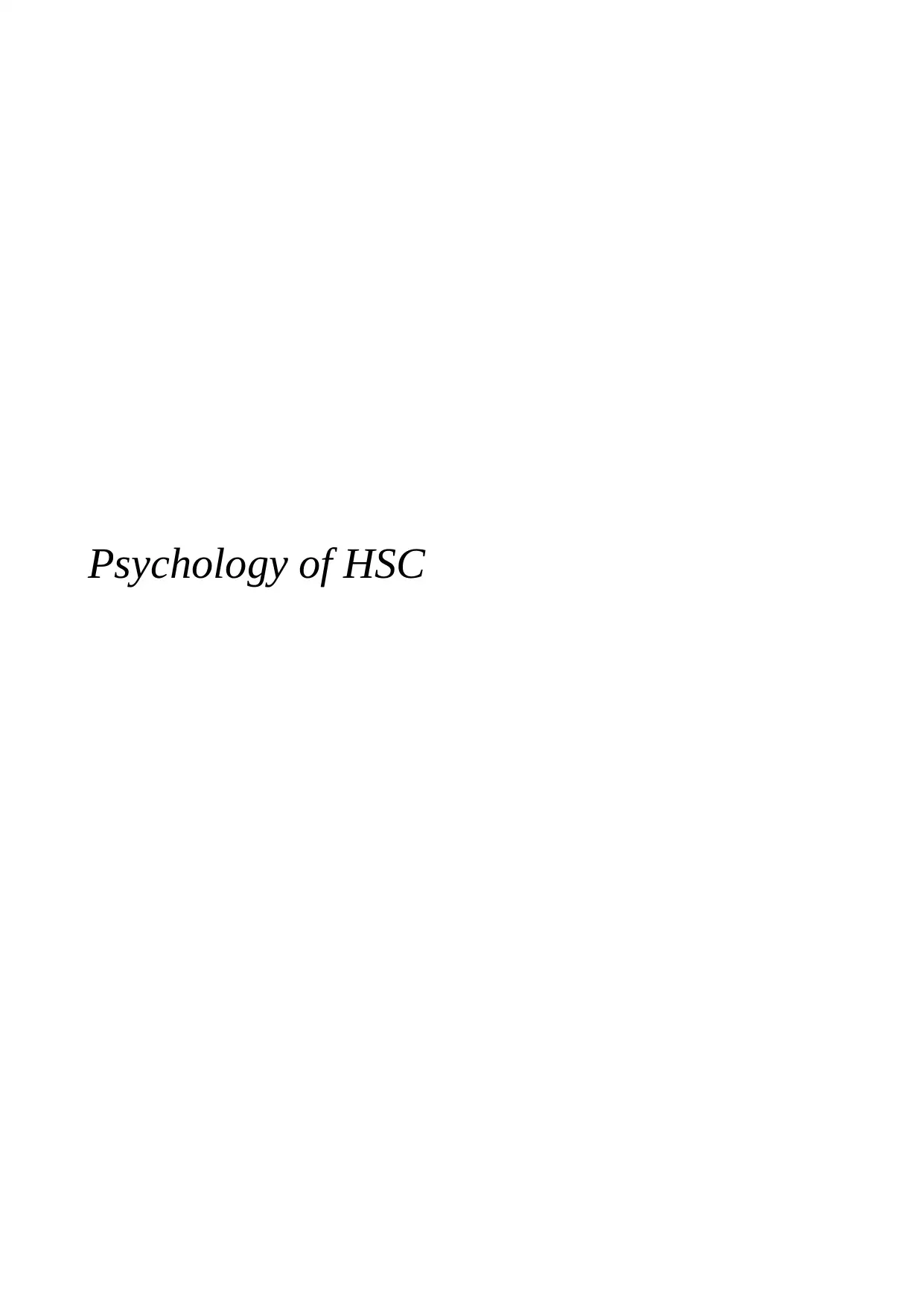
Psychology of HSC
Paraphrase This Document
Need a fresh take? Get an instant paraphrase of this document with our AI Paraphraser
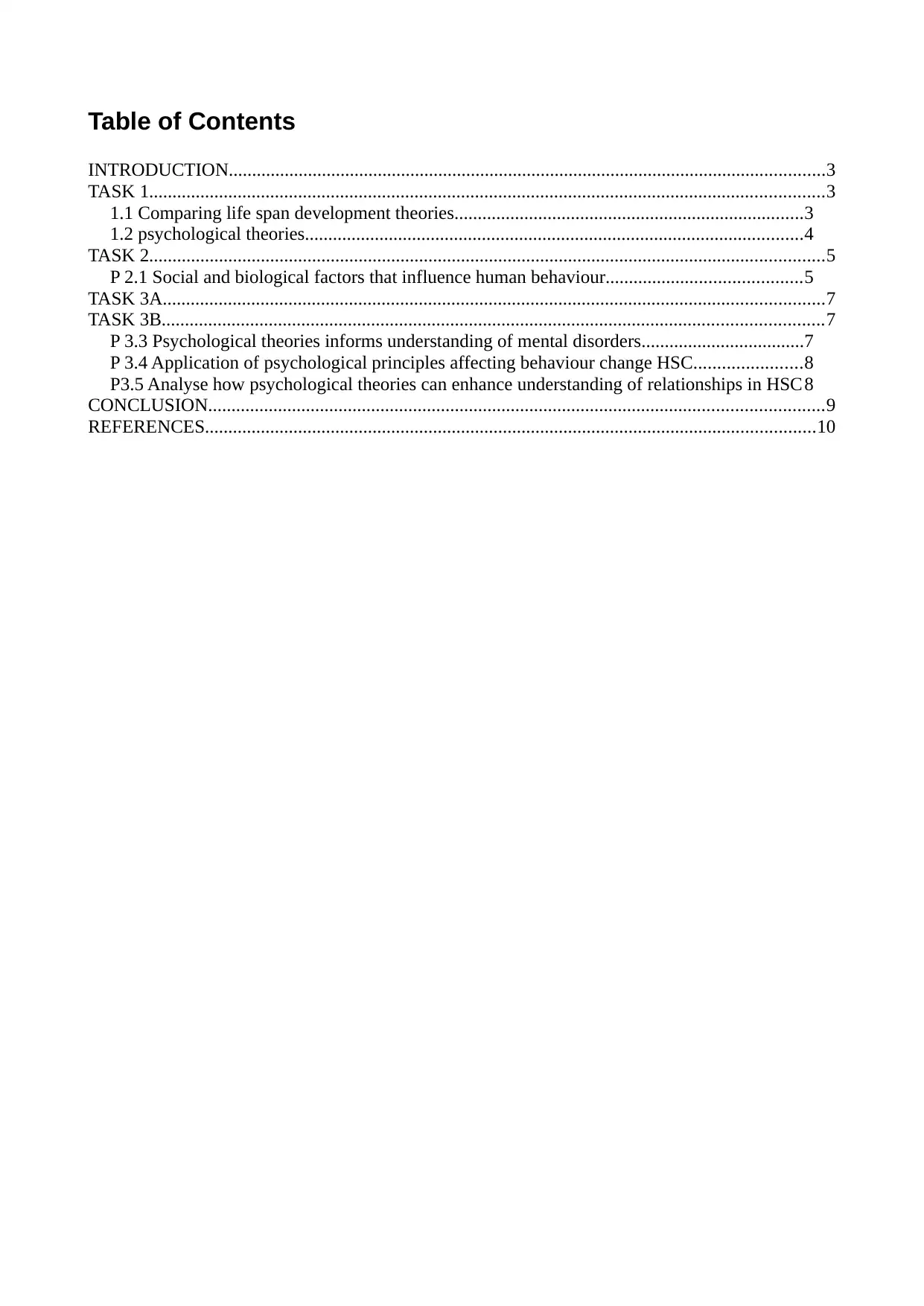
Table of Contents
INTRODUCTION................................................................................................................................3
TASK 1.................................................................................................................................................3
1.1 Comparing life span development theories...........................................................................3
1.2 psychological theories...........................................................................................................4
TASK 2.................................................................................................................................................5
P 2.1 Social and biological factors that influence human behaviour..........................................5
TASK 3A..............................................................................................................................................7
TASK 3B..............................................................................................................................................7
P 3.3 Psychological theories informs understanding of mental disorders...................................7
P 3.4 Application of psychological principles affecting behaviour change HSC.......................8
P3.5 Analyse how psychological theories can enhance understanding of relationships in HSC 8
CONCLUSION....................................................................................................................................9
REFERENCES...................................................................................................................................10
INTRODUCTION................................................................................................................................3
TASK 1.................................................................................................................................................3
1.1 Comparing life span development theories...........................................................................3
1.2 psychological theories...........................................................................................................4
TASK 2.................................................................................................................................................5
P 2.1 Social and biological factors that influence human behaviour..........................................5
TASK 3A..............................................................................................................................................7
TASK 3B..............................................................................................................................................7
P 3.3 Psychological theories informs understanding of mental disorders...................................7
P 3.4 Application of psychological principles affecting behaviour change HSC.......................8
P3.5 Analyse how psychological theories can enhance understanding of relationships in HSC 8
CONCLUSION....................................................................................................................................9
REFERENCES...................................................................................................................................10
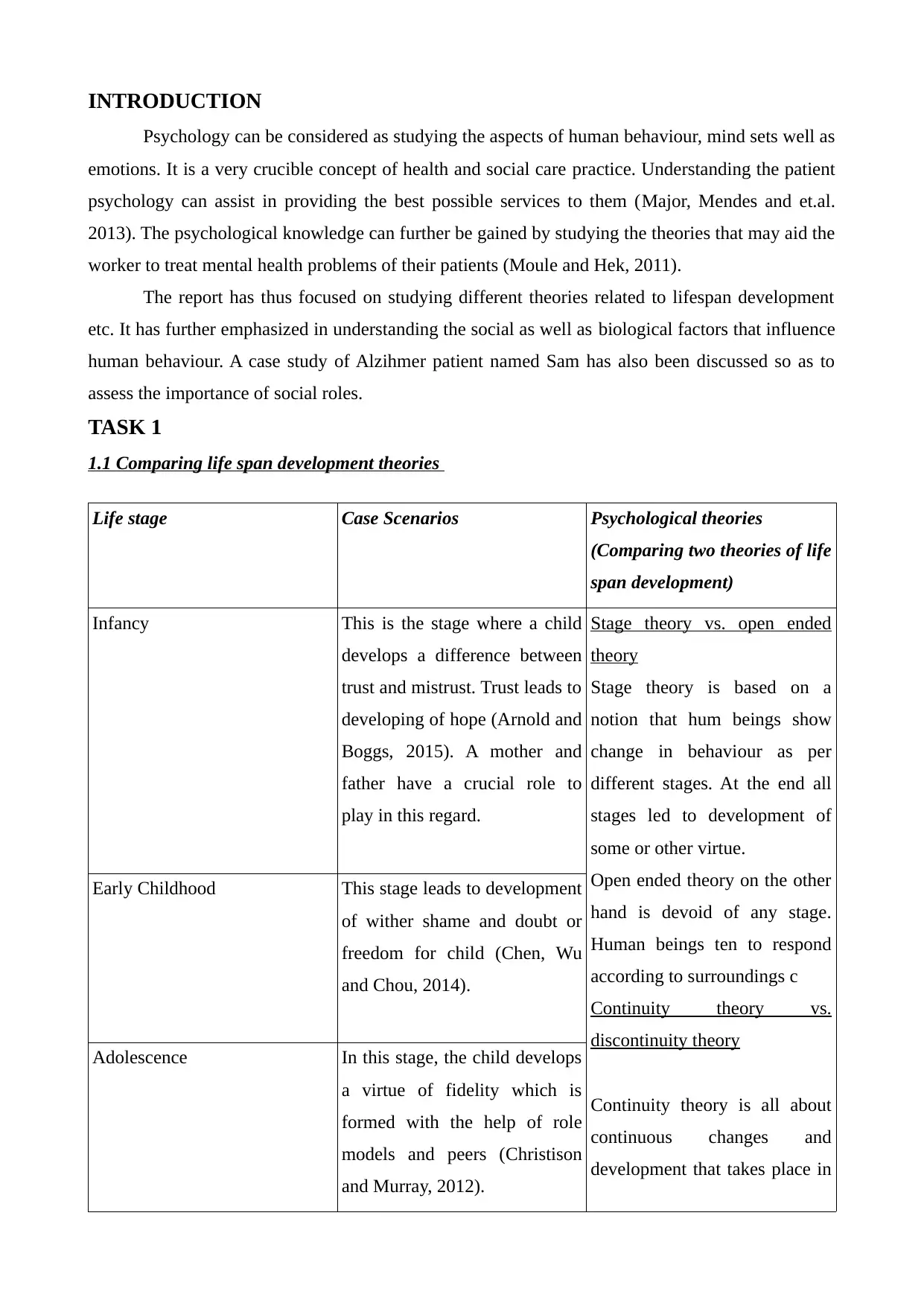
INTRODUCTION
Psychology can be considered as studying the aspects of human behaviour, mind sets well as
emotions. It is a very crucible concept of health and social care practice. Understanding the patient
psychology can assist in providing the best possible services to them (Major, Mendes and et.al.
2013). The psychological knowledge can further be gained by studying the theories that may aid the
worker to treat mental health problems of their patients (Moule and Hek, 2011).
The report has thus focused on studying different theories related to lifespan development
etc. It has further emphasized in understanding the social as well as biological factors that influence
human behaviour. A case study of Alzihmer patient named Sam has also been discussed so as to
assess the importance of social roles.
TASK 1
1.1 Comparing life span development theories
Life stage Case Scenarios Psychological theories
(Comparing two theories of life
span development)
Infancy This is the stage where a child
develops a difference between
trust and mistrust. Trust leads to
developing of hope (Arnold and
Boggs, 2015). A mother and
father have a crucial role to
play in this regard.
Stage theory vs. open ended
theory
Stage theory is based on a
notion that hum beings show
change in behaviour as per
different stages. At the end all
stages led to development of
some or other virtue.
Open ended theory on the other
hand is devoid of any stage.
Human beings ten to respond
according to surroundings c
Continuity theory vs.
discontinuity theory
Continuity theory is all about
continuous changes and
development that takes place in
Early Childhood This stage leads to development
of wither shame and doubt or
freedom for child (Chen, Wu
and Chou, 2014).
Adolescence In this stage, the child develops
a virtue of fidelity which is
formed with the help of role
models and peers (Christison
and Murray, 2012).
Psychology can be considered as studying the aspects of human behaviour, mind sets well as
emotions. It is a very crucible concept of health and social care practice. Understanding the patient
psychology can assist in providing the best possible services to them (Major, Mendes and et.al.
2013). The psychological knowledge can further be gained by studying the theories that may aid the
worker to treat mental health problems of their patients (Moule and Hek, 2011).
The report has thus focused on studying different theories related to lifespan development
etc. It has further emphasized in understanding the social as well as biological factors that influence
human behaviour. A case study of Alzihmer patient named Sam has also been discussed so as to
assess the importance of social roles.
TASK 1
1.1 Comparing life span development theories
Life stage Case Scenarios Psychological theories
(Comparing two theories of life
span development)
Infancy This is the stage where a child
develops a difference between
trust and mistrust. Trust leads to
developing of hope (Arnold and
Boggs, 2015). A mother and
father have a crucial role to
play in this regard.
Stage theory vs. open ended
theory
Stage theory is based on a
notion that hum beings show
change in behaviour as per
different stages. At the end all
stages led to development of
some or other virtue.
Open ended theory on the other
hand is devoid of any stage.
Human beings ten to respond
according to surroundings c
Continuity theory vs.
discontinuity theory
Continuity theory is all about
continuous changes and
development that takes place in
Early Childhood This stage leads to development
of wither shame and doubt or
freedom for child (Chen, Wu
and Chou, 2014).
Adolescence In this stage, the child develops
a virtue of fidelity which is
formed with the help of role
models and peers (Christison
and Murray, 2012).
⊘ This is a preview!⊘
Do you want full access?
Subscribe today to unlock all pages.

Trusted by 1+ million students worldwide
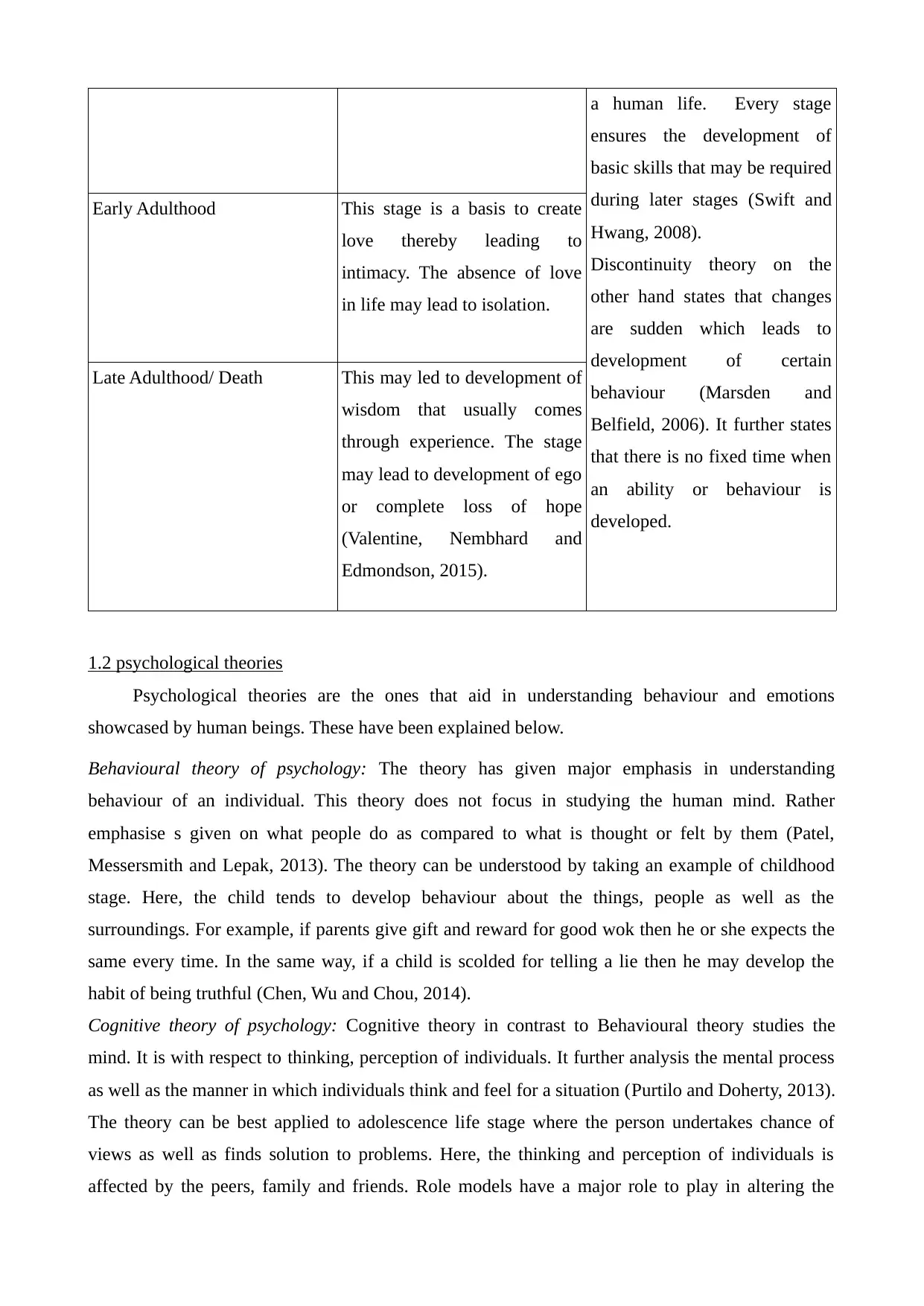
a human life. Every stage
ensures the development of
basic skills that may be required
during later stages (Swift and
Hwang, 2008).
Discontinuity theory on the
other hand states that changes
are sudden which leads to
development of certain
behaviour (Marsden and
Belfield, 2006). It further states
that there is no fixed time when
an ability or behaviour is
developed.
Early Adulthood This stage is a basis to create
love thereby leading to
intimacy. The absence of love
in life may lead to isolation.
Late Adulthood/ Death This may led to development of
wisdom that usually comes
through experience. The stage
may lead to development of ego
or complete loss of hope
(Valentine, Nembhard and
Edmondson, 2015).
1.2 psychological theories
Psychological theories are the ones that aid in understanding behaviour and emotions
showcased by human beings. These have been explained below.
Behavioural theory of psychology: The theory has given major emphasis in understanding
behaviour of an individual. This theory does not focus in studying the human mind. Rather
emphasise s given on what people do as compared to what is thought or felt by them (Patel,
Messersmith and Lepak, 2013). The theory can be understood by taking an example of childhood
stage. Here, the child tends to develop behaviour about the things, people as well as the
surroundings. For example, if parents give gift and reward for good wok then he or she expects the
same every time. In the same way, if a child is scolded for telling a lie then he may develop the
habit of being truthful (Chen, Wu and Chou, 2014).
Cognitive theory of psychology: Cognitive theory in contrast to Behavioural theory studies the
mind. It is with respect to thinking, perception of individuals. It further analysis the mental process
as well as the manner in which individuals think and feel for a situation (Purtilo and Doherty, 2013).
The theory can be best applied to adolescence life stage where the person undertakes chance of
views as well as finds solution to problems. Here, the thinking and perception of individuals is
affected by the peers, family and friends. Role models have a major role to play in altering the
ensures the development of
basic skills that may be required
during later stages (Swift and
Hwang, 2008).
Discontinuity theory on the
other hand states that changes
are sudden which leads to
development of certain
behaviour (Marsden and
Belfield, 2006). It further states
that there is no fixed time when
an ability or behaviour is
developed.
Early Adulthood This stage is a basis to create
love thereby leading to
intimacy. The absence of love
in life may lead to isolation.
Late Adulthood/ Death This may led to development of
wisdom that usually comes
through experience. The stage
may lead to development of ego
or complete loss of hope
(Valentine, Nembhard and
Edmondson, 2015).
1.2 psychological theories
Psychological theories are the ones that aid in understanding behaviour and emotions
showcased by human beings. These have been explained below.
Behavioural theory of psychology: The theory has given major emphasis in understanding
behaviour of an individual. This theory does not focus in studying the human mind. Rather
emphasise s given on what people do as compared to what is thought or felt by them (Patel,
Messersmith and Lepak, 2013). The theory can be understood by taking an example of childhood
stage. Here, the child tends to develop behaviour about the things, people as well as the
surroundings. For example, if parents give gift and reward for good wok then he or she expects the
same every time. In the same way, if a child is scolded for telling a lie then he may develop the
habit of being truthful (Chen, Wu and Chou, 2014).
Cognitive theory of psychology: Cognitive theory in contrast to Behavioural theory studies the
mind. It is with respect to thinking, perception of individuals. It further analysis the mental process
as well as the manner in which individuals think and feel for a situation (Purtilo and Doherty, 2013).
The theory can be best applied to adolescence life stage where the person undertakes chance of
views as well as finds solution to problems. Here, the thinking and perception of individuals is
affected by the peers, family and friends. Role models have a major role to play in altering the
Paraphrase This Document
Need a fresh take? Get an instant paraphrase of this document with our AI Paraphraser
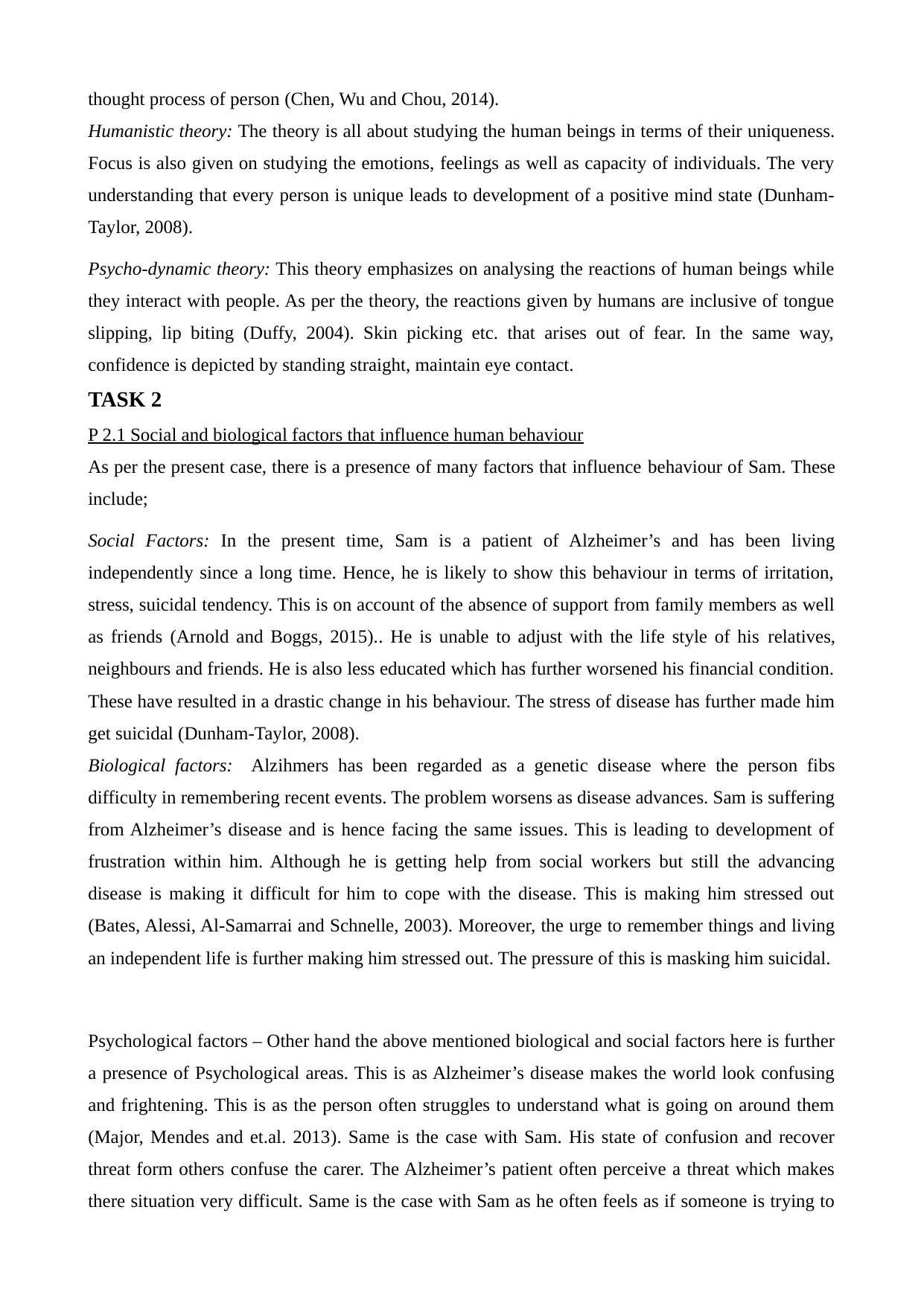
thought process of person (Chen, Wu and Chou, 2014).
Humanistic theory: The theory is all about studying the human beings in terms of their uniqueness.
Focus is also given on studying the emotions, feelings as well as capacity of individuals. The very
understanding that every person is unique leads to development of a positive mind state (Dunham-
Taylor, 2008).
Psycho-dynamic theory: This theory emphasizes on analysing the reactions of human beings while
they interact with people. As per the theory, the reactions given by humans are inclusive of tongue
slipping, lip biting (Duffy, 2004). Skin picking etc. that arises out of fear. In the same way,
confidence is depicted by standing straight, maintain eye contact.
TASK 2
P 2.1 Social and biological factors that influence human behaviour
As per the present case, there is a presence of many factors that influence behaviour of Sam. These
include;
Social Factors: In the present time, Sam is a patient of Alzheimer’s and has been living
independently since a long time. Hence, he is likely to show this behaviour in terms of irritation,
stress, suicidal tendency. This is on account of the absence of support from family members as well
as friends (Arnold and Boggs, 2015).. He is unable to adjust with the life style of his relatives,
neighbours and friends. He is also less educated which has further worsened his financial condition.
These have resulted in a drastic change in his behaviour. The stress of disease has further made him
get suicidal (Dunham-Taylor, 2008).
Biological factors: Alzihmers has been regarded as a genetic disease where the person fibs
difficulty in remembering recent events. The problem worsens as disease advances. Sam is suffering
from Alzheimer’s disease and is hence facing the same issues. This is leading to development of
frustration within him. Although he is getting help from social workers but still the advancing
disease is making it difficult for him to cope with the disease. This is making him stressed out
(Bates, Alessi, Al-Samarrai and Schnelle, 2003). Moreover, the urge to remember things and living
an independent life is further making him stressed out. The pressure of this is masking him suicidal.
Psychological factors – Other hand the above mentioned biological and social factors here is further
a presence of Psychological areas. This is as Alzheimer’s disease makes the world look confusing
and frightening. This is as the person often struggles to understand what is going on around them
(Major, Mendes and et.al. 2013). Same is the case with Sam. His state of confusion and recover
threat form others confuse the carer. The Alzheimer’s patient often perceive a threat which makes
there situation very difficult. Same is the case with Sam as he often feels as if someone is trying to
Humanistic theory: The theory is all about studying the human beings in terms of their uniqueness.
Focus is also given on studying the emotions, feelings as well as capacity of individuals. The very
understanding that every person is unique leads to development of a positive mind state (Dunham-
Taylor, 2008).
Psycho-dynamic theory: This theory emphasizes on analysing the reactions of human beings while
they interact with people. As per the theory, the reactions given by humans are inclusive of tongue
slipping, lip biting (Duffy, 2004). Skin picking etc. that arises out of fear. In the same way,
confidence is depicted by standing straight, maintain eye contact.
TASK 2
P 2.1 Social and biological factors that influence human behaviour
As per the present case, there is a presence of many factors that influence behaviour of Sam. These
include;
Social Factors: In the present time, Sam is a patient of Alzheimer’s and has been living
independently since a long time. Hence, he is likely to show this behaviour in terms of irritation,
stress, suicidal tendency. This is on account of the absence of support from family members as well
as friends (Arnold and Boggs, 2015).. He is unable to adjust with the life style of his relatives,
neighbours and friends. He is also less educated which has further worsened his financial condition.
These have resulted in a drastic change in his behaviour. The stress of disease has further made him
get suicidal (Dunham-Taylor, 2008).
Biological factors: Alzihmers has been regarded as a genetic disease where the person fibs
difficulty in remembering recent events. The problem worsens as disease advances. Sam is suffering
from Alzheimer’s disease and is hence facing the same issues. This is leading to development of
frustration within him. Although he is getting help from social workers but still the advancing
disease is making it difficult for him to cope with the disease. This is making him stressed out
(Bates, Alessi, Al-Samarrai and Schnelle, 2003). Moreover, the urge to remember things and living
an independent life is further making him stressed out. The pressure of this is masking him suicidal.
Psychological factors – Other hand the above mentioned biological and social factors here is further
a presence of Psychological areas. This is as Alzheimer’s disease makes the world look confusing
and frightening. This is as the person often struggles to understand what is going on around them
(Major, Mendes and et.al. 2013). Same is the case with Sam. His state of confusion and recover
threat form others confuse the carer. The Alzheimer’s patient often perceive a threat which makes
there situation very difficult. Same is the case with Sam as he often feels as if someone is trying to
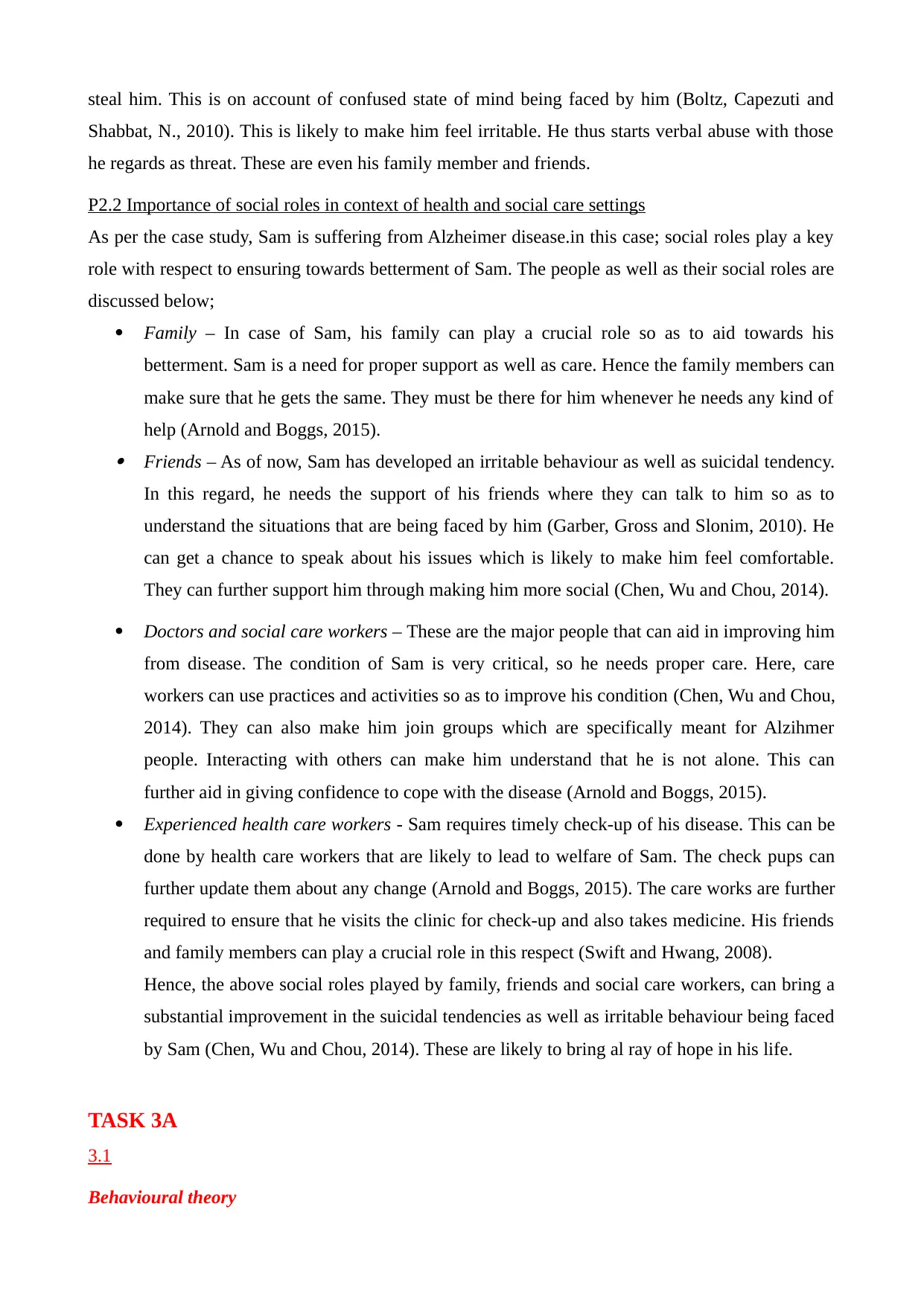
steal him. This is on account of confused state of mind being faced by him (Boltz, Capezuti and
Shabbat, N., 2010). This is likely to make him feel irritable. He thus starts verbal abuse with those
he regards as threat. These are even his family member and friends.
P2.2 Importance of social roles in context of health and social care settings
As per the case study, Sam is suffering from Alzheimer disease.in this case; social roles play a key
role with respect to ensuring towards betterment of Sam. The people as well as their social roles are
discussed below;
Family – In case of Sam, his family can play a crucial role so as to aid towards his
betterment. Sam is a need for proper support as well as care. Hence the family members can
make sure that he gets the same. They must be there for him whenever he needs any kind of
help (Arnold and Boggs, 2015). Friends – As of now, Sam has developed an irritable behaviour as well as suicidal tendency.
In this regard, he needs the support of his friends where they can talk to him so as to
understand the situations that are being faced by him (Garber, Gross and Slonim, 2010). He
can get a chance to speak about his issues which is likely to make him feel comfortable.
They can further support him through making him more social (Chen, Wu and Chou, 2014).
Doctors and social care workers – These are the major people that can aid in improving him
from disease. The condition of Sam is very critical, so he needs proper care. Here, care
workers can use practices and activities so as to improve his condition (Chen, Wu and Chou,
2014). They can also make him join groups which are specifically meant for Alzihmer
people. Interacting with others can make him understand that he is not alone. This can
further aid in giving confidence to cope with the disease (Arnold and Boggs, 2015).
Experienced health care workers - Sam requires timely check-up of his disease. This can be
done by health care workers that are likely to lead to welfare of Sam. The check pups can
further update them about any change (Arnold and Boggs, 2015). The care works are further
required to ensure that he visits the clinic for check-up and also takes medicine. His friends
and family members can play a crucial role in this respect (Swift and Hwang, 2008).
Hence, the above social roles played by family, friends and social care workers, can bring a
substantial improvement in the suicidal tendencies as well as irritable behaviour being faced
by Sam (Chen, Wu and Chou, 2014). These are likely to bring al ray of hope in his life.
TASK 3A
3.1
Behavioural theory
Shabbat, N., 2010). This is likely to make him feel irritable. He thus starts verbal abuse with those
he regards as threat. These are even his family member and friends.
P2.2 Importance of social roles in context of health and social care settings
As per the case study, Sam is suffering from Alzheimer disease.in this case; social roles play a key
role with respect to ensuring towards betterment of Sam. The people as well as their social roles are
discussed below;
Family – In case of Sam, his family can play a crucial role so as to aid towards his
betterment. Sam is a need for proper support as well as care. Hence the family members can
make sure that he gets the same. They must be there for him whenever he needs any kind of
help (Arnold and Boggs, 2015). Friends – As of now, Sam has developed an irritable behaviour as well as suicidal tendency.
In this regard, he needs the support of his friends where they can talk to him so as to
understand the situations that are being faced by him (Garber, Gross and Slonim, 2010). He
can get a chance to speak about his issues which is likely to make him feel comfortable.
They can further support him through making him more social (Chen, Wu and Chou, 2014).
Doctors and social care workers – These are the major people that can aid in improving him
from disease. The condition of Sam is very critical, so he needs proper care. Here, care
workers can use practices and activities so as to improve his condition (Chen, Wu and Chou,
2014). They can also make him join groups which are specifically meant for Alzihmer
people. Interacting with others can make him understand that he is not alone. This can
further aid in giving confidence to cope with the disease (Arnold and Boggs, 2015).
Experienced health care workers - Sam requires timely check-up of his disease. This can be
done by health care workers that are likely to lead to welfare of Sam. The check pups can
further update them about any change (Arnold and Boggs, 2015). The care works are further
required to ensure that he visits the clinic for check-up and also takes medicine. His friends
and family members can play a crucial role in this respect (Swift and Hwang, 2008).
Hence, the above social roles played by family, friends and social care workers, can bring a
substantial improvement in the suicidal tendencies as well as irritable behaviour being faced
by Sam (Chen, Wu and Chou, 2014). These are likely to bring al ray of hope in his life.
TASK 3A
3.1
Behavioural theory
⊘ This is a preview!⊘
Do you want full access?
Subscribe today to unlock all pages.

Trusted by 1+ million students worldwide
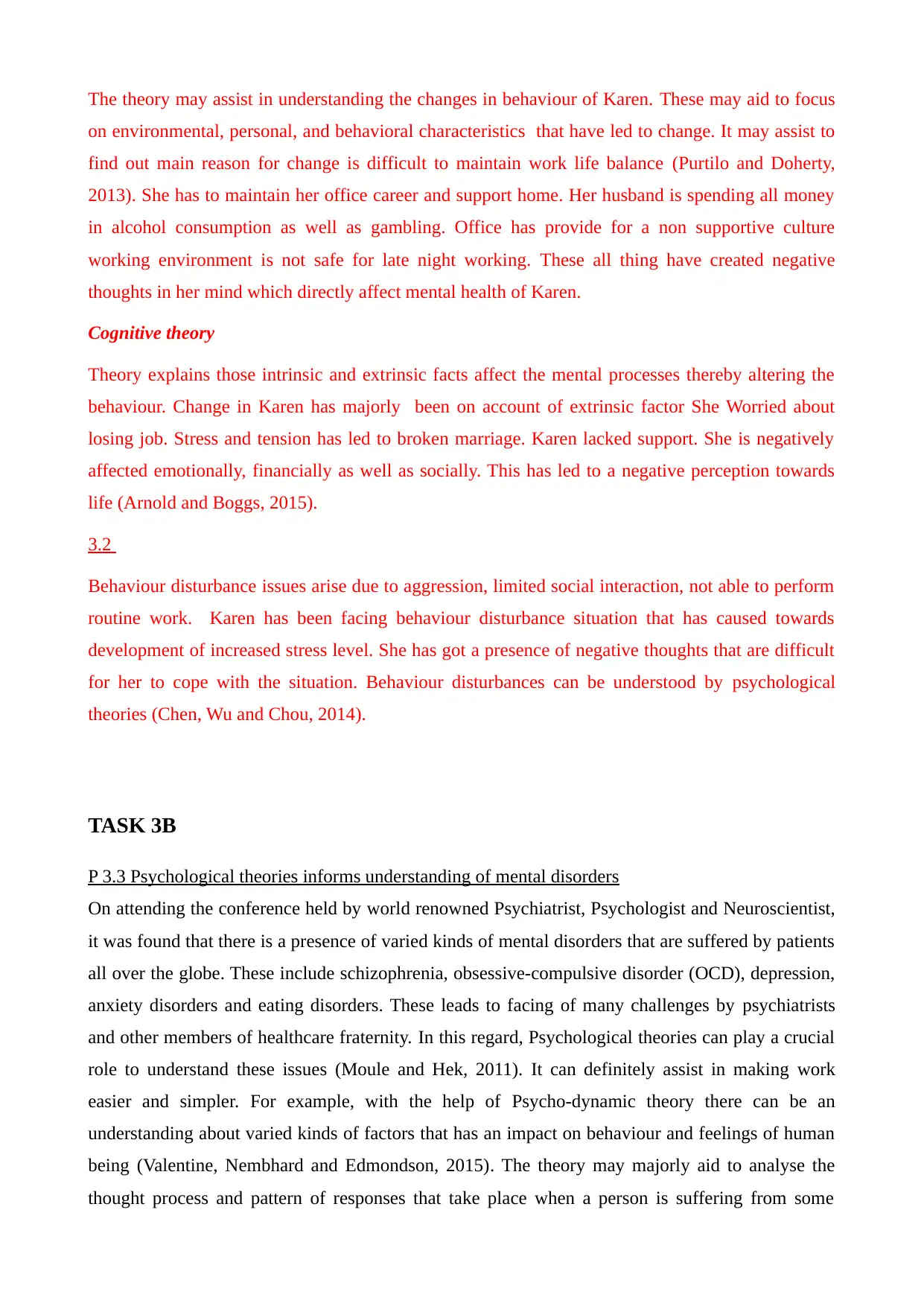
The theory may assist in understanding the changes in behaviour of Karen. These may aid to focus
on environmental, personal, and behavioral characteristics that have led to change. It may assist to
find out main reason for change is difficult to maintain work life balance (Purtilo and Doherty,
2013). She has to maintain her office career and support home. Her husband is spending all money
in alcohol consumption as well as gambling. Office has provide for a non supportive culture
working environment is not safe for late night working. These all thing have created negative
thoughts in her mind which directly affect mental health of Karen.
Cognitive theory
Theory explains those intrinsic and extrinsic facts affect the mental processes thereby altering the
behaviour. Change in Karen has majorly been on account of extrinsic factor She Worried about
losing job. Stress and tension has led to broken marriage. Karen lacked support. She is negatively
affected emotionally, financially as well as socially. This has led to a negative perception towards
life (Arnold and Boggs, 2015).
3.2
Behaviour disturbance issues arise due to aggression, limited social interaction, not able to perform
routine work. Karen has been facing behaviour disturbance situation that has caused towards
development of increased stress level. She has got a presence of negative thoughts that are difficult
for her to cope with the situation. Behaviour disturbances can be understood by psychological
theories (Chen, Wu and Chou, 2014).
TASK 3B
P 3.3 Psychological theories informs understanding of mental disorders
On attending the conference held by world renowned Psychiatrist, Psychologist and Neuroscientist,
it was found that there is a presence of varied kinds of mental disorders that are suffered by patients
all over the globe. These include schizophrenia, obsessive-compulsive disorder (OCD), depression,
anxiety disorders and eating disorders. These leads to facing of many challenges by psychiatrists
and other members of healthcare fraternity. In this regard, Psychological theories can play a crucial
role to understand these issues (Moule and Hek, 2011). It can definitely assist in making work
easier and simpler. For example, with the help of Psycho-dynamic theory there can be an
understanding about varied kinds of factors that has an impact on behaviour and feelings of human
being (Valentine, Nembhard and Edmondson, 2015). The theory may majorly aid to analyse the
thought process and pattern of responses that take place when a person is suffering from some
on environmental, personal, and behavioral characteristics that have led to change. It may assist to
find out main reason for change is difficult to maintain work life balance (Purtilo and Doherty,
2013). She has to maintain her office career and support home. Her husband is spending all money
in alcohol consumption as well as gambling. Office has provide for a non supportive culture
working environment is not safe for late night working. These all thing have created negative
thoughts in her mind which directly affect mental health of Karen.
Cognitive theory
Theory explains those intrinsic and extrinsic facts affect the mental processes thereby altering the
behaviour. Change in Karen has majorly been on account of extrinsic factor She Worried about
losing job. Stress and tension has led to broken marriage. Karen lacked support. She is negatively
affected emotionally, financially as well as socially. This has led to a negative perception towards
life (Arnold and Boggs, 2015).
3.2
Behaviour disturbance issues arise due to aggression, limited social interaction, not able to perform
routine work. Karen has been facing behaviour disturbance situation that has caused towards
development of increased stress level. She has got a presence of negative thoughts that are difficult
for her to cope with the situation. Behaviour disturbances can be understood by psychological
theories (Chen, Wu and Chou, 2014).
TASK 3B
P 3.3 Psychological theories informs understanding of mental disorders
On attending the conference held by world renowned Psychiatrist, Psychologist and Neuroscientist,
it was found that there is a presence of varied kinds of mental disorders that are suffered by patients
all over the globe. These include schizophrenia, obsessive-compulsive disorder (OCD), depression,
anxiety disorders and eating disorders. These leads to facing of many challenges by psychiatrists
and other members of healthcare fraternity. In this regard, Psychological theories can play a crucial
role to understand these issues (Moule and Hek, 2011). It can definitely assist in making work
easier and simpler. For example, with the help of Psycho-dynamic theory there can be an
understanding about varied kinds of factors that has an impact on behaviour and feelings of human
being (Valentine, Nembhard and Edmondson, 2015). The theory may majorly aid to analyse the
thought process and pattern of responses that take place when a person is suffering from some
Paraphrase This Document
Need a fresh take? Get an instant paraphrase of this document with our AI Paraphraser
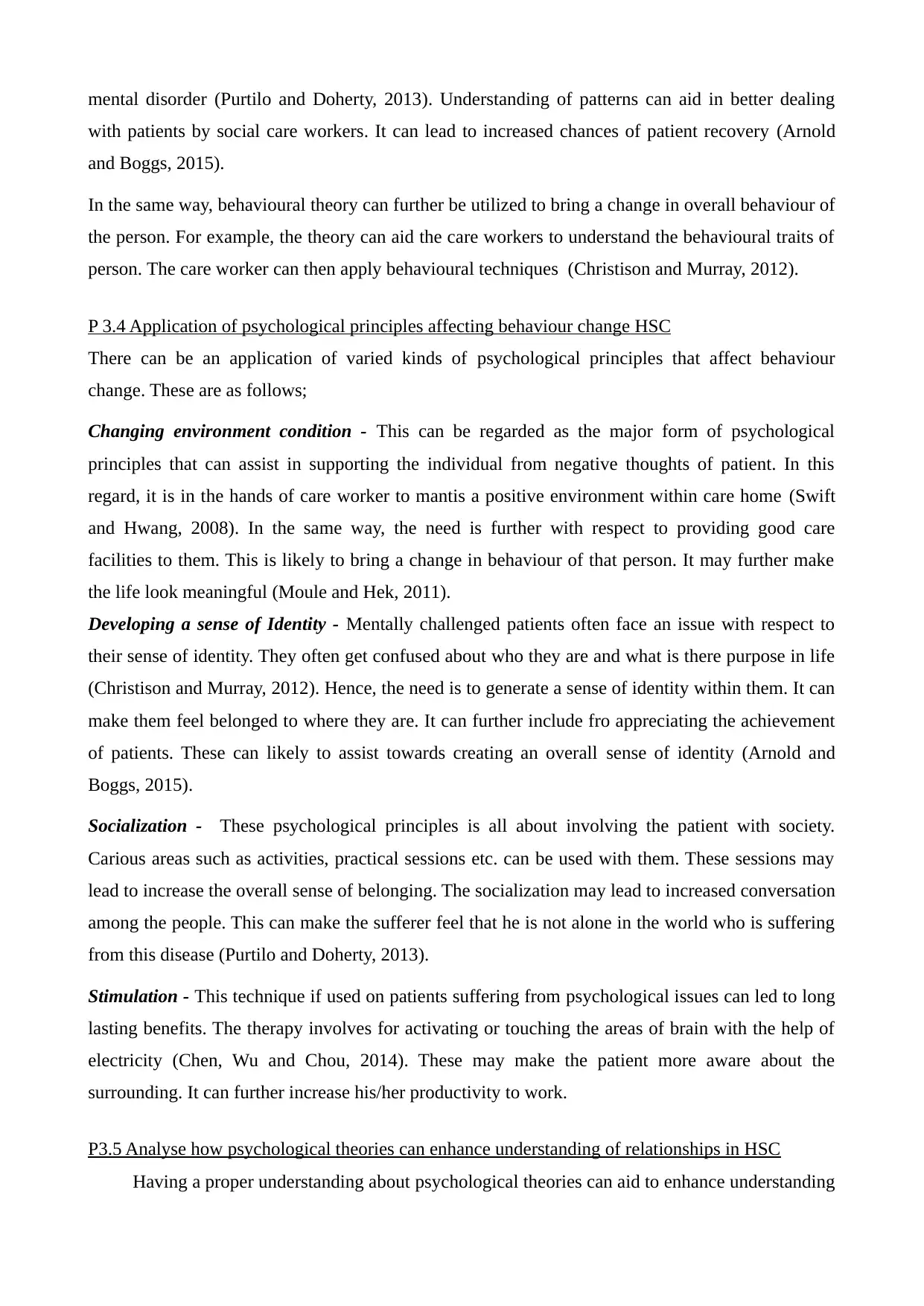
mental disorder (Purtilo and Doherty, 2013). Understanding of patterns can aid in better dealing
with patients by social care workers. It can lead to increased chances of patient recovery (Arnold
and Boggs, 2015).
In the same way, behavioural theory can further be utilized to bring a change in overall behaviour of
the person. For example, the theory can aid the care workers to understand the behavioural traits of
person. The care worker can then apply behavioural techniques (Christison and Murray, 2012).
P 3.4 Application of psychological principles affecting behaviour change HSC
There can be an application of varied kinds of psychological principles that affect behaviour
change. These are as follows;
Changing environment condition - This can be regarded as the major form of psychological
principles that can assist in supporting the individual from negative thoughts of patient. In this
regard, it is in the hands of care worker to mantis a positive environment within care home (Swift
and Hwang, 2008). In the same way, the need is further with respect to providing good care
facilities to them. This is likely to bring a change in behaviour of that person. It may further make
the life look meaningful (Moule and Hek, 2011).
Developing a sense of Identity - Mentally challenged patients often face an issue with respect to
their sense of identity. They often get confused about who they are and what is there purpose in life
(Christison and Murray, 2012). Hence, the need is to generate a sense of identity within them. It can
make them feel belonged to where they are. It can further include fro appreciating the achievement
of patients. These can likely to assist towards creating an overall sense of identity (Arnold and
Boggs, 2015).
Socialization - These psychological principles is all about involving the patient with society.
Carious areas such as activities, practical sessions etc. can be used with them. These sessions may
lead to increase the overall sense of belonging. The socialization may lead to increased conversation
among the people. This can make the sufferer feel that he is not alone in the world who is suffering
from this disease (Purtilo and Doherty, 2013).
Stimulation - This technique if used on patients suffering from psychological issues can led to long
lasting benefits. The therapy involves for activating or touching the areas of brain with the help of
electricity (Chen, Wu and Chou, 2014). These may make the patient more aware about the
surrounding. It can further increase his/her productivity to work.
P3.5 Analyse how psychological theories can enhance understanding of relationships in HSC
Having a proper understanding about psychological theories can aid to enhance understanding
with patients by social care workers. It can lead to increased chances of patient recovery (Arnold
and Boggs, 2015).
In the same way, behavioural theory can further be utilized to bring a change in overall behaviour of
the person. For example, the theory can aid the care workers to understand the behavioural traits of
person. The care worker can then apply behavioural techniques (Christison and Murray, 2012).
P 3.4 Application of psychological principles affecting behaviour change HSC
There can be an application of varied kinds of psychological principles that affect behaviour
change. These are as follows;
Changing environment condition - This can be regarded as the major form of psychological
principles that can assist in supporting the individual from negative thoughts of patient. In this
regard, it is in the hands of care worker to mantis a positive environment within care home (Swift
and Hwang, 2008). In the same way, the need is further with respect to providing good care
facilities to them. This is likely to bring a change in behaviour of that person. It may further make
the life look meaningful (Moule and Hek, 2011).
Developing a sense of Identity - Mentally challenged patients often face an issue with respect to
their sense of identity. They often get confused about who they are and what is there purpose in life
(Christison and Murray, 2012). Hence, the need is to generate a sense of identity within them. It can
make them feel belonged to where they are. It can further include fro appreciating the achievement
of patients. These can likely to assist towards creating an overall sense of identity (Arnold and
Boggs, 2015).
Socialization - These psychological principles is all about involving the patient with society.
Carious areas such as activities, practical sessions etc. can be used with them. These sessions may
lead to increase the overall sense of belonging. The socialization may lead to increased conversation
among the people. This can make the sufferer feel that he is not alone in the world who is suffering
from this disease (Purtilo and Doherty, 2013).
Stimulation - This technique if used on patients suffering from psychological issues can led to long
lasting benefits. The therapy involves for activating or touching the areas of brain with the help of
electricity (Chen, Wu and Chou, 2014). These may make the patient more aware about the
surrounding. It can further increase his/her productivity to work.
P3.5 Analyse how psychological theories can enhance understanding of relationships in HSC
Having a proper understanding about psychological theories can aid to enhance understanding
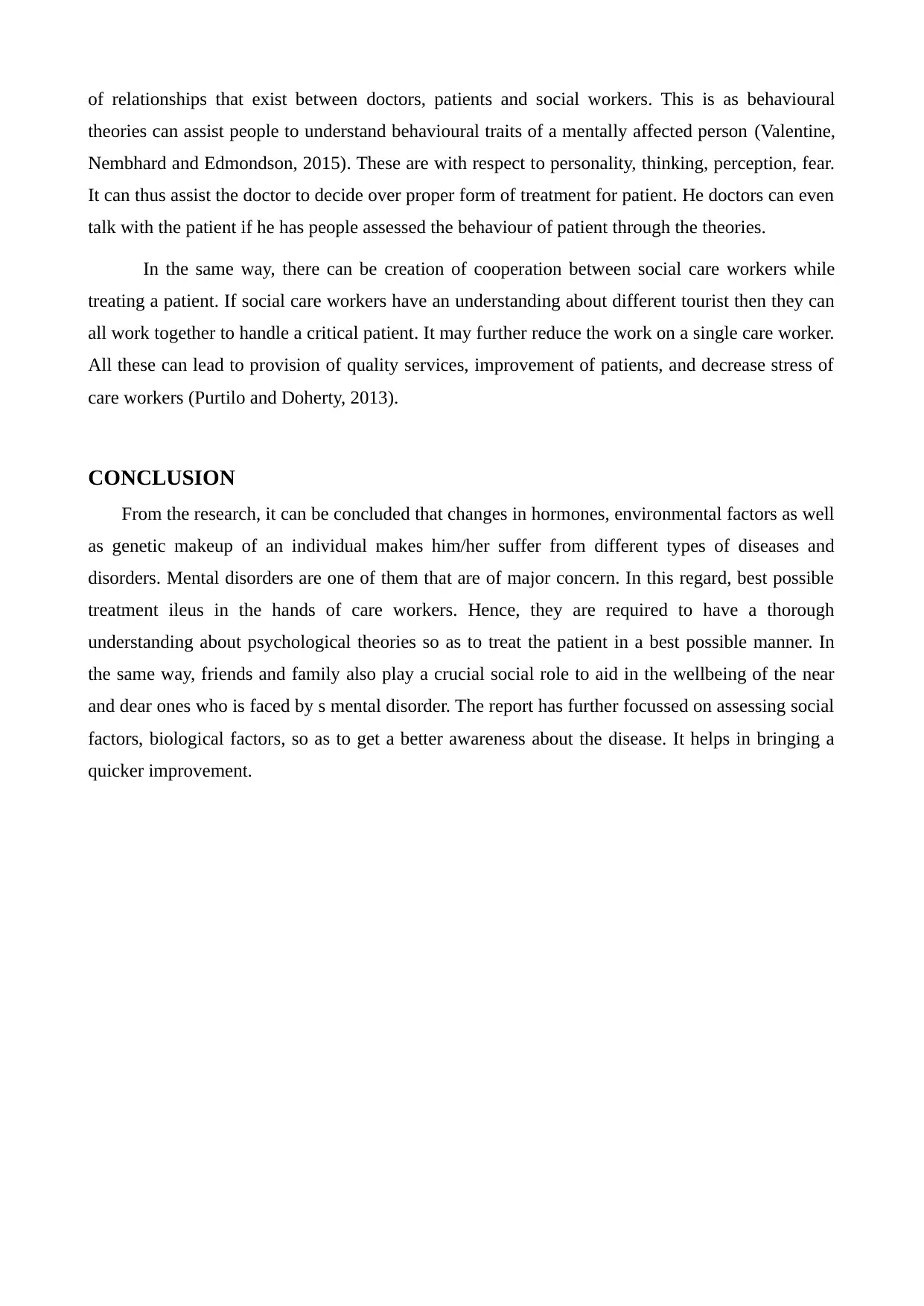
of relationships that exist between doctors, patients and social workers. This is as behavioural
theories can assist people to understand behavioural traits of a mentally affected person (Valentine,
Nembhard and Edmondson, 2015). These are with respect to personality, thinking, perception, fear.
It can thus assist the doctor to decide over proper form of treatment for patient. He doctors can even
talk with the patient if he has people assessed the behaviour of patient through the theories.
In the same way, there can be creation of cooperation between social care workers while
treating a patient. If social care workers have an understanding about different tourist then they can
all work together to handle a critical patient. It may further reduce the work on a single care worker.
All these can lead to provision of quality services, improvement of patients, and decrease stress of
care workers (Purtilo and Doherty, 2013).
CONCLUSION
From the research, it can be concluded that changes in hormones, environmental factors as well
as genetic makeup of an individual makes him/her suffer from different types of diseases and
disorders. Mental disorders are one of them that are of major concern. In this regard, best possible
treatment ileus in the hands of care workers. Hence, they are required to have a thorough
understanding about psychological theories so as to treat the patient in a best possible manner. In
the same way, friends and family also play a crucial social role to aid in the wellbeing of the near
and dear ones who is faced by s mental disorder. The report has further focussed on assessing social
factors, biological factors, so as to get a better awareness about the disease. It helps in bringing a
quicker improvement.
theories can assist people to understand behavioural traits of a mentally affected person (Valentine,
Nembhard and Edmondson, 2015). These are with respect to personality, thinking, perception, fear.
It can thus assist the doctor to decide over proper form of treatment for patient. He doctors can even
talk with the patient if he has people assessed the behaviour of patient through the theories.
In the same way, there can be creation of cooperation between social care workers while
treating a patient. If social care workers have an understanding about different tourist then they can
all work together to handle a critical patient. It may further reduce the work on a single care worker.
All these can lead to provision of quality services, improvement of patients, and decrease stress of
care workers (Purtilo and Doherty, 2013).
CONCLUSION
From the research, it can be concluded that changes in hormones, environmental factors as well
as genetic makeup of an individual makes him/her suffer from different types of diseases and
disorders. Mental disorders are one of them that are of major concern. In this regard, best possible
treatment ileus in the hands of care workers. Hence, they are required to have a thorough
understanding about psychological theories so as to treat the patient in a best possible manner. In
the same way, friends and family also play a crucial social role to aid in the wellbeing of the near
and dear ones who is faced by s mental disorder. The report has further focussed on assessing social
factors, biological factors, so as to get a better awareness about the disease. It helps in bringing a
quicker improvement.
⊘ This is a preview!⊘
Do you want full access?
Subscribe today to unlock all pages.

Trusted by 1+ million students worldwide
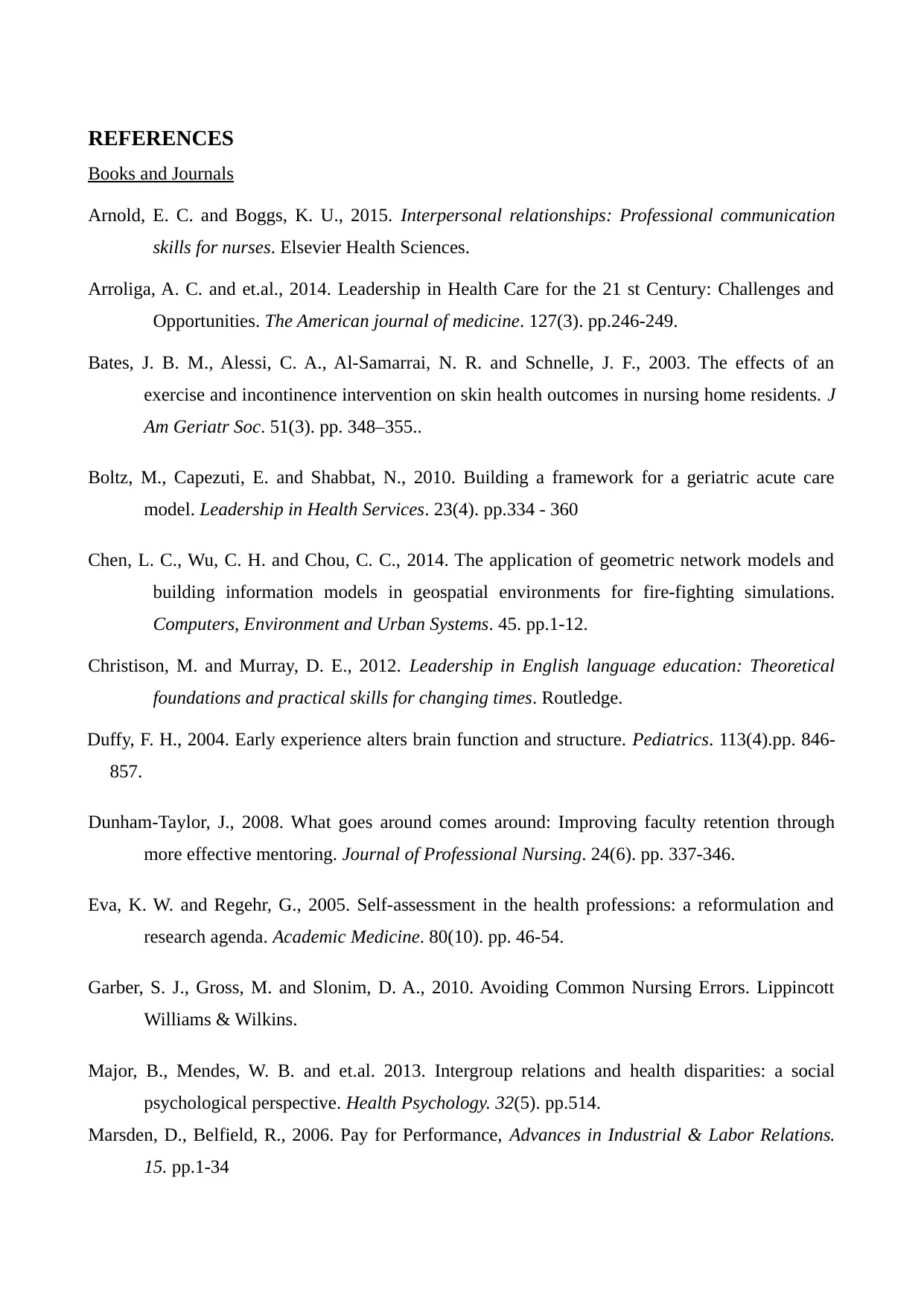
REFERENCES
Books and Journals
Arnold, E. C. and Boggs, K. U., 2015. Interpersonal relationships: Professional communication
skills for nurses. Elsevier Health Sciences.
Arroliga, A. C. and et.al., 2014. Leadership in Health Care for the 21 st Century: Challenges and
Opportunities. The American journal of medicine. 127(3). pp.246-249.
Bates, J. B. M., Alessi, C. A., Al-Samarrai, N. R. and Schnelle, J. F., 2003. The effects of an
exercise and incontinence intervention on skin health outcomes in nursing home residents. J
Am Geriatr Soc. 51(3). pp. 348–355..
Boltz, M., Capezuti, E. and Shabbat, N., 2010. Building a framework for a geriatric acute care
model. Leadership in Health Services. 23(4). pp.334 - 360
Chen, L. C., Wu, C. H. and Chou, C. C., 2014. The application of geometric network models and
building information models in geospatial environments for fire-fighting simulations.
Computers, Environment and Urban Systems. 45. pp.1-12.
Christison, M. and Murray, D. E., 2012. Leadership in English language education: Theoretical
foundations and practical skills for changing times. Routledge.
Duffy, F. H., 2004. Early experience alters brain function and structure. Pediatrics. 113(4).pp. 846-
857.
Dunham-Taylor, J., 2008. What goes around comes around: Improving faculty retention through
more effective mentoring. Journal of Professional Nursing. 24(6). pp. 337-346.
Eva, K. W. and Regehr, G., 2005. Self-assessment in the health professions: a reformulation and
research agenda. Academic Medicine. 80(10). pp. 46-54.
Garber, S. J., Gross, M. and Slonim, D. A., 2010. Avoiding Common Nursing Errors. Lippincott
Williams & Wilkins.
Major, B., Mendes, W. B. and et.al. 2013. Intergroup relations and health disparities: a social
psychological perspective. Health Psychology. 32(5). pp.514.
Marsden, D., Belfield, R., 2006. Pay for Performance, Advances in Industrial & Labor Relations.
15. pp.1-34
Books and Journals
Arnold, E. C. and Boggs, K. U., 2015. Interpersonal relationships: Professional communication
skills for nurses. Elsevier Health Sciences.
Arroliga, A. C. and et.al., 2014. Leadership in Health Care for the 21 st Century: Challenges and
Opportunities. The American journal of medicine. 127(3). pp.246-249.
Bates, J. B. M., Alessi, C. A., Al-Samarrai, N. R. and Schnelle, J. F., 2003. The effects of an
exercise and incontinence intervention on skin health outcomes in nursing home residents. J
Am Geriatr Soc. 51(3). pp. 348–355..
Boltz, M., Capezuti, E. and Shabbat, N., 2010. Building a framework for a geriatric acute care
model. Leadership in Health Services. 23(4). pp.334 - 360
Chen, L. C., Wu, C. H. and Chou, C. C., 2014. The application of geometric network models and
building information models in geospatial environments for fire-fighting simulations.
Computers, Environment and Urban Systems. 45. pp.1-12.
Christison, M. and Murray, D. E., 2012. Leadership in English language education: Theoretical
foundations and practical skills for changing times. Routledge.
Duffy, F. H., 2004. Early experience alters brain function and structure. Pediatrics. 113(4).pp. 846-
857.
Dunham-Taylor, J., 2008. What goes around comes around: Improving faculty retention through
more effective mentoring. Journal of Professional Nursing. 24(6). pp. 337-346.
Eva, K. W. and Regehr, G., 2005. Self-assessment in the health professions: a reformulation and
research agenda. Academic Medicine. 80(10). pp. 46-54.
Garber, S. J., Gross, M. and Slonim, D. A., 2010. Avoiding Common Nursing Errors. Lippincott
Williams & Wilkins.
Major, B., Mendes, W. B. and et.al. 2013. Intergroup relations and health disparities: a social
psychological perspective. Health Psychology. 32(5). pp.514.
Marsden, D., Belfield, R., 2006. Pay for Performance, Advances in Industrial & Labor Relations.
15. pp.1-34
Paraphrase This Document
Need a fresh take? Get an instant paraphrase of this document with our AI Paraphraser
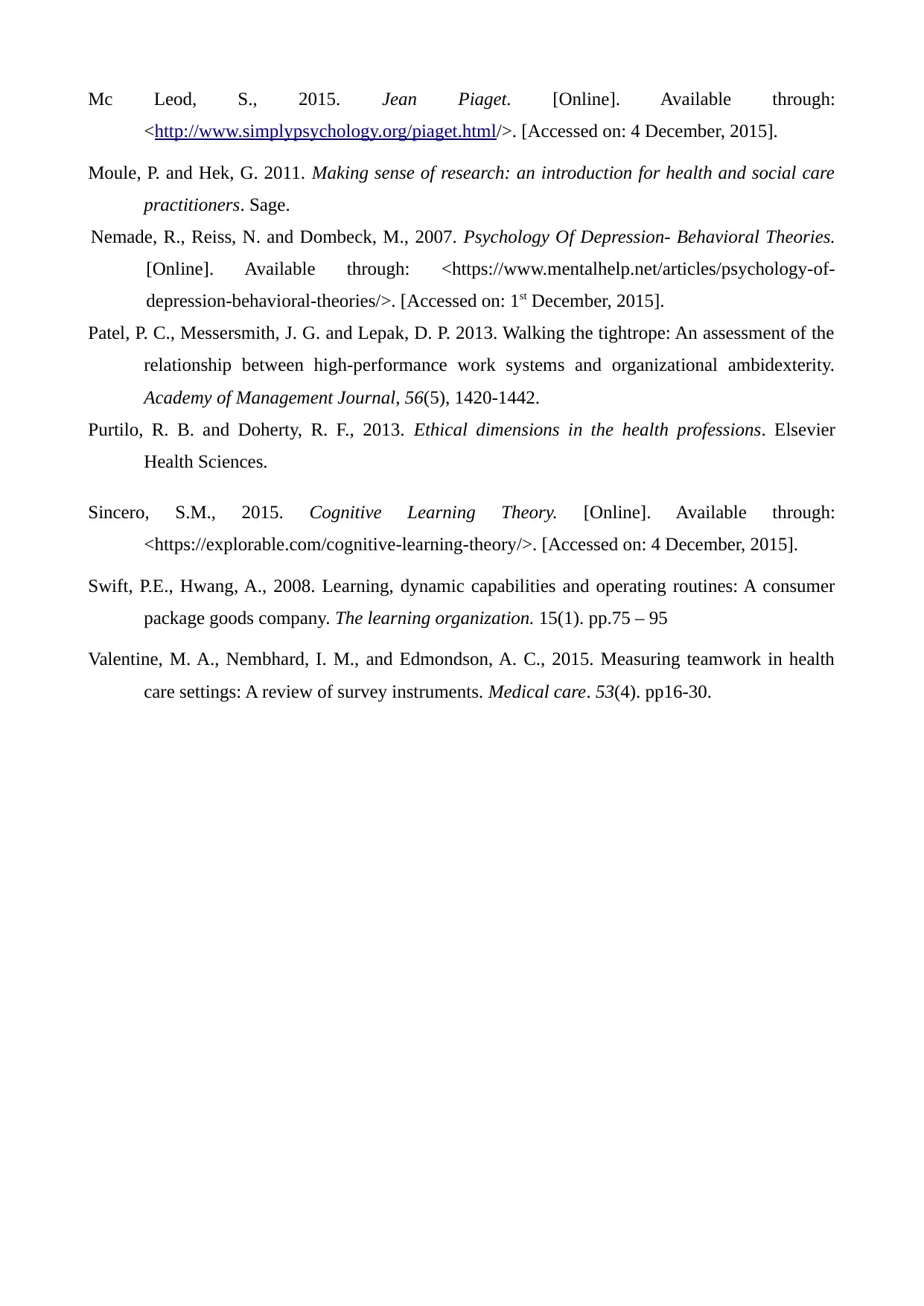
Mc Leod, S., 2015. Jean Piaget. [Online]. Available through:
<http://www.simplypsychology.org/piaget.html/>. [Accessed on: 4 December, 2015].
Moule, P. and Hek, G. 2011. Making sense of research: an introduction for health and social care
practitioners. Sage.
Nemade, R., Reiss, N. and Dombeck, M., 2007. Psychology Of Depression- Behavioral Theories.
[Online]. Available through: <https://www.mentalhelp.net/articles/psychology-of-
depression-behavioral-theories/>. [Accessed on: 1st December, 2015].
Patel, P. C., Messersmith, J. G. and Lepak, D. P. 2013. Walking the tightrope: An assessment of the
relationship between high-performance work systems and organizational ambidexterity.
Academy of Management Journal, 56(5), 1420-1442.
Purtilo, R. B. and Doherty, R. F., 2013. Ethical dimensions in the health professions. Elsevier
Health Sciences.
Sincero, S.M., 2015. Cognitive Learning Theory. [Online]. Available through:
<https://explorable.com/cognitive-learning-theory/>. [Accessed on: 4 December, 2015].
Swift, P.E., Hwang, A., 2008. Learning, dynamic capabilities and operating routines: A consumer
package goods company. The learning organization. 15(1). pp.75 – 95
Valentine, M. A., Nembhard, I. M., and Edmondson, A. C., 2015. Measuring teamwork in health
care settings: A review of survey instruments. Medical care. 53(4). pp16-30.
<http://www.simplypsychology.org/piaget.html/>. [Accessed on: 4 December, 2015].
Moule, P. and Hek, G. 2011. Making sense of research: an introduction for health and social care
practitioners. Sage.
Nemade, R., Reiss, N. and Dombeck, M., 2007. Psychology Of Depression- Behavioral Theories.
[Online]. Available through: <https://www.mentalhelp.net/articles/psychology-of-
depression-behavioral-theories/>. [Accessed on: 1st December, 2015].
Patel, P. C., Messersmith, J. G. and Lepak, D. P. 2013. Walking the tightrope: An assessment of the
relationship between high-performance work systems and organizational ambidexterity.
Academy of Management Journal, 56(5), 1420-1442.
Purtilo, R. B. and Doherty, R. F., 2013. Ethical dimensions in the health professions. Elsevier
Health Sciences.
Sincero, S.M., 2015. Cognitive Learning Theory. [Online]. Available through:
<https://explorable.com/cognitive-learning-theory/>. [Accessed on: 4 December, 2015].
Swift, P.E., Hwang, A., 2008. Learning, dynamic capabilities and operating routines: A consumer
package goods company. The learning organization. 15(1). pp.75 – 95
Valentine, M. A., Nembhard, I. M., and Edmondson, A. C., 2015. Measuring teamwork in health
care settings: A review of survey instruments. Medical care. 53(4). pp16-30.
1 out of 11
Related Documents
Your All-in-One AI-Powered Toolkit for Academic Success.
+13062052269
info@desklib.com
Available 24*7 on WhatsApp / Email
![[object Object]](/_next/static/media/star-bottom.7253800d.svg)
Unlock your academic potential
Copyright © 2020–2026 A2Z Services. All Rights Reserved. Developed and managed by ZUCOL.





